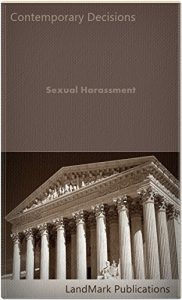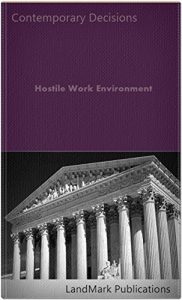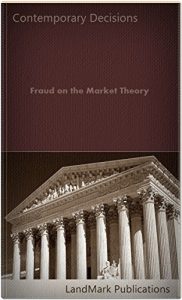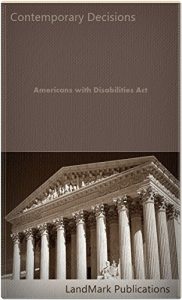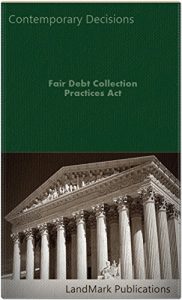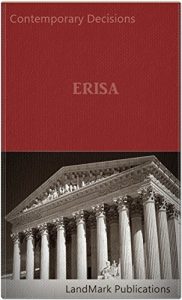THIS CASEBOOK contains a selection of 220 U. S. Court of Appeals decisions that analyze and discuss issues surrounding allegations of sexual harassment in the workplace. The selection of decisions spans from 2006 to the date of publication.
Title VII of the Civil Rights Act of 1964 prohibits employers from "discriminat[ing] against any individual with respect to his compensation, terms, conditions, or privileges of employment, because of such individual's race, color, religion, sex, or national origin." 42 U.S.C. § 2000e-2(a)(1). Plaintiffs alleging sex discrimination, including for sexual harassment, may recover on a theory of a hostile work environment. Meritor Sav. Bank, FSB v. Vinson, 477 U.S. 57, 73, 106 S.Ct. 2399, 91 L.Ed.2d 49 (1986). The Supreme Court has construed Title VII to allow hostile work environment claims where the harasser and the victim are of the same sex. Oncale v. Sundowner Offshore Servs., Inc., 523 U.S. 75, 82, 118 S.Ct. 998, 140 L.Ed.2d 201 (1998). Smith v. Rock-Tenn Services, Inc., 813 F. 3d 298 (6th Cir. 2016).
In general, to prevail on a hostile work environment claim, a plaintiff must show that (1) he or she was a member of a protected class; (2) he or she was subjected to unwelcome sexual harassment; (3) the harassment complained of was based on sex; (4) the charged sexual harassment created a hostile work environment; and (5) the employer is liable. Randolph v. Ohio Dep't of Youth Servs., 453 F.3d 724, 733 (6th Cir.2006). To establish employer liability where the harasser is a coworker, a plaintiff must show that the employer knew or should have known of the conduct and failed to take prompt and appropriate corrective action. E.E.O.C. v. Harbert-Yeargin, Inc., 266 F.3d 498, 518 (6th Cir. 2001). Smith v. Rock-Tenn Services, Inc., ibid.
* * *
Title IX of the Education Amendments of 1972 provides that "[n]o person in the United States shall, on the basis of sex, be excluded from participation in, be denied the benefits of, or be subjected to discrimination under any education program or activity receiving Federal financial assistance." See 20 U.S.C. § 1681(a). An implied right of action for such claims lies only "against the educational institution itself." Frazier v. Fairhaven Sch. Comm., 276 F.3d 52, 65 (1st Cir.2002). Morgan v. Town of Lexington, MA, 823 F. 3d 737 (1st Cir. 2016).
Sexual harassment in schools can constitute prohibited sex-based discrimination actionable under Title IX where there is a "hostile environment," such that "acts of sexual harassment [are] sufficiently severe and pervasive to compromise or interfere with educational opportunities normally available to students," and relevant school officials with actual knowledge of the harassment "exhibit[] deliberate indifference to [the harassment]." Id. at 65, 66. Student on student harassment can be actionable. Davis ex rel. LaShonda D. v. Monroe Cty. Bd. of Educ., 526 U.S. 629, 643, 119 S.Ct. 1661, 143 L.Ed.2d 839 (1999). The purportedly illegal acts must be taken "on the basis of sex." See Frazier, 276 F.3d at 66 ("Discrimination on the basis of sex is the sine qua non of a Title IX sexual harassment case, and a failure to plead that element is fatal."). However, "harassing conduct need not be motivated by sexual desire to support an inference of discrimination on the basis of sex." Oncale v. Sundowner Offshore Servs., Inc., 523 U.S. 75, 80, 118 S.Ct. 998, 140 L.Ed.2d 201 (1998). Morgan v. Town of Lexington, MA, ibid.
Title VII of the Civil Rights Act of 1964 prohibits employers from "discriminat[ing] against any individual with respect to his compensation, terms, conditions, or privileges of employment, because of such individual's race, color, religion, sex, or national origin." 42 U.S.C. § 2000e-2(a)(1). Plaintiffs alleging sex discrimination, including for sexual harassment, may recover on a theory of a hostile work environment. Meritor Sav. Bank, FSB v. Vinson, 477 U.S. 57, 73, 106 S.Ct. 2399, 91 L.Ed.2d 49 (1986). The Supreme Court has construed Title VII to allow hostile work environment claims where the harasser and the victim are of the same sex. Oncale v. Sundowner Offshore Servs., Inc., 523 U.S. 75, 82, 118 S.Ct. 998, 140 L.Ed.2d 201 (1998). Smith v. Rock-Tenn Services, Inc., 813 F. 3d 298 (6th Cir. 2016).
In general, to prevail on a hostile work environment claim, a plaintiff must show that (1) he or she was a member of a protected class; (2) he or she was subjected to unwelcome sexual harassment; (3) the harassment complained of was based on sex; (4) the charged sexual harassment created a hostile work environment; and (5) the employer is liable. Randolph v. Ohio Dep't of Youth Servs., 453 F.3d 724, 733 (6th Cir.2006). To establish employer liability where the harasser is a coworker, a plaintiff must show that the employer knew or should have known of the conduct and failed to take prompt and appropriate corrective action. E.E.O.C. v. Harbert-Yeargin, Inc., 266 F.3d 498, 518 (6th Cir. 2001). Smith v. Rock-Tenn Services, Inc., ibid.
* * *
Title IX of the Education Amendments of 1972 provides that "[n]o person in the United States shall, on the basis of sex, be excluded from participation in, be denied the benefits of, or be subjected to discrimination under any education program or activity receiving Federal financial assistance." See 20 U.S.C. § 1681(a). An implied right of action for such claims lies only "against the educational institution itself." Frazier v. Fairhaven Sch. Comm., 276 F.3d 52, 65 (1st Cir.2002). Morgan v. Town of Lexington, MA, 823 F. 3d 737 (1st Cir. 2016).
Sexual harassment in schools can constitute prohibited sex-based discrimination actionable under Title IX where there is a "hostile environment," such that "acts of sexual harassment [are] sufficiently severe and pervasive to compromise or interfere with educational opportunities normally available to students," and relevant school officials with actual knowledge of the harassment "exhibit[] deliberate indifference to [the harassment]." Id. at 65, 66. Student on student harassment can be actionable. Davis ex rel. LaShonda D. v. Monroe Cty. Bd. of Educ., 526 U.S. 629, 643, 119 S.Ct. 1661, 143 L.Ed.2d 839 (1999). The purportedly illegal acts must be taken "on the basis of sex." See Frazier, 276 F.3d at 66 ("Discrimination on the basis of sex is the sine qua non of a Title IX sexual harassment case, and a failure to plead that element is fatal."). However, "harassing conduct need not be motivated by sexual desire to support an inference of discrimination on the basis of sex." Oncale v. Sundowner Offshore Servs., Inc., 523 U.S. 75, 80, 118 S.Ct. 998, 140 L.Ed.2d 201 (1998). Morgan v. Town of Lexington, MA, ibid.
